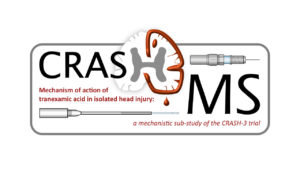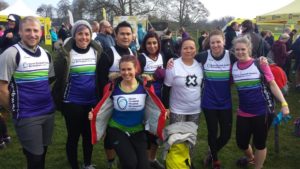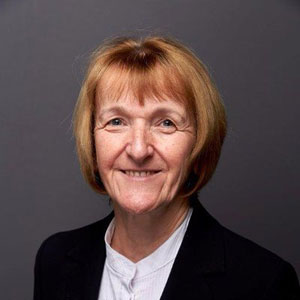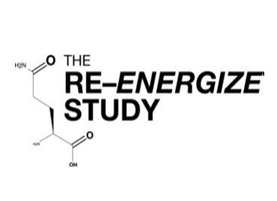The launch of the University of Birmingham’s (UoB) new Centre for Trauma Sciences (CTSR) took place on 26th March and was combined with the exciting Show and Tell event for the NIHR Surgical Reconstruction and Microbiology Research Centre (SRMRC).
The event was held in the Medical School at the University and was well attended by scientists, academics, military personnel, clinicians, students and representation from the Department of Health and Social Care. The CTSR will work collaboratively with the NIHR SRMRC, the recently established Scar Free Foundation Centre for Conflict Wound Research and other national groups to develop technological and scientific advances within trauma science.
Starting the day, the event warmly welcomed Mr Tim Jones, Chief Innovation Officer, University Hospitals Birmingham Foundation Trust (UHBFT), and Professor David Adams, Head of College of Medical and Dental Sciences and Dean of Medicine, UoB who gave supportive and enthusiastic opening speeches. Following this Tony Belli, Director of NIHR SRMRC and Professor of Trauma Neurosurgery and Ann Logan, Head of the CTSR and Professor of Molecular Neuroscience, spoke of their perspectives on the establishment of the new Centre and the synergies with the NIHR SRMRC.
The day’s talks were organised into 4 themes; Inflammation and Acute Response, New Technologies for Traumatic Brain Injury, Smart Dressings and Trauma Rehabilitation:
Theme 1 – Dr Paul Harrison was first to present, with his talk “Gelsolin as a novel replacement therapy for trauma and burns?” Gelsolin is currently being investigated as a novel therapy to reduce complications of trauma. The next talk was provided by Dr Jon Hazeldine with his talk “The ultra-early immune and inflammatory response to major trauma“. Jon outlined what is currently known about the immunological status of patients in the pre-hospital setting, within the first hour or Golden Hour of traumatic injury. It is hoped that this research could help identify patients that are at risk of poorer clinical outcomes. Lt Col Mark Foster talked about “A prospective randomised study investigating dehydroepiandrosterone (DHEA) and its profile in trauma”. DHEA is a hormone produced by the adrenal glands that has been observed in previous experiments to activate the immune system.
Theme 2 – In the second session, Dr Valentina Di Pietro spoke to “Circulating microRNAs: new players in the management of concussion”. Currently, there are no objective, biomarker-based tests to detect the presence or the severity of concussion. MicroRNAs have been identified in a previous study that can indicate traumatic brain injury (TBI). Identification of these will now form the basis of “The Birmingham Concussion Test”. Next, Prof Belli further discussed concussion in his talk entitled “Sport concussion: from lab to pitch side“. Prof Belli outlined some of the issues and challenges associated with diagnosing and treating concussion, and its effect on participation in sport. Finally, in this session, Dr Dave Davies gave his talk “Red light does not necessarily say danger in TBI”. Red light can be used to monitor injured, brain tissue. Dr Davies discussed the potential of near infra-red spectroscopy to monitor the magnitude of injury and its possible use as a disease-modifying therapy in TBI.
Poster Prize – Over lunch attendees were able to network and view several student posters. The posters were judged and we are very pleased to report that Dr Kamal Yakoub, NIHR SRMRC Neurotrauma Clinical Research Fellow, won first prize for his poster “Serum miR-502: a sensitive biomarker for the diagnosis of concussion in patients with normal brain imaging”
Theme 3 – After lunch, the talks resumed with the Smart Dressings theme, where Prof Logan presented her talk “The potential of new anti-scarring drugs” which included discussion around Decorin, a peptide found in blood that is important for the structural organisation of collagen. Next, Professor Nick Barnes talked around “Developing decorin mimetics”. Lastly, in this session, Prof Liam Grover presented his talk entitled “Developing smart dressings“. Prof Grover gave an overview of how he and his group have been able to manipulate the properties of various materials to increase their functionality and enhance the process of wound healing.
Theme 4 – The final talks were started by Dr Tom Clutton-Brock, entitled “Human factors and usability in the development of trauma-related technology” and “The role of use and usability studies in robotic rehabilitation“. Dr Clutton-Brock gave an overview of the science and development behind new trauma and rehabilitation-related medical devices. The last talks of the day were delivered by Dr Christel McMullan and Professor Melanie Calvert from the Centre for Patient Reported Outcome Research (CPROR) at the University. Dr McMullan and Prof Calvert discussed the PRiORiTy study which aims to develop a computerised means to capture patient-reported outcomes (PROMs) and patient-reported experience outcomes (PREMs).
SRMRC Show and Tell – Introduced by Sir Keith Porter, previous Director of the SRMRC and Professor of Clinical Traumatology, the Show and Tell event provided an opportunity for students and researchers to engage with a variety of groups, including members of various UHBFT based Patient and Public Involvement (PPI) groups, about their research. There were demonstrations from research teams across trauma, burns and PROMs with engaging and interactive stands covering The Birmingham Concussion Test, Traumatic Brain Injury, Scar Treatment, Alternatives to Antibiotics, Developing Novel Medical Devices, Rehabilitation of the Brain-Injured Patient and Precision Rehabilitation for Spinal Pain. The Burns Team, represented by Khaled Al-Tarrah, Krupali Patel and Liam Cato, were awarded the prize for best stand. We extend huge congratulations to them. Thousand Elders member, John Hurman, stated that he was “delighted to discover what research is happening and events like this enlarge the microcosmic role of the university”.
In closing the day, Professor Tony Belli extended sincere thanks to all who made the day possible and described the future as “very exciting”. Profs Belli and Logan thanked UHBFT, the Department of Health and Social Care and the Ministry of Defence for their funds and ongoing support in trauma research. Finally, Sir Keith Porter added that Birmingham has truly “been at the forefront” of trauma research for years and that today with the launch of the CTSR, marks an “inspirational” and “important milestone” in the development of trauma research and cross-college collaboration.





